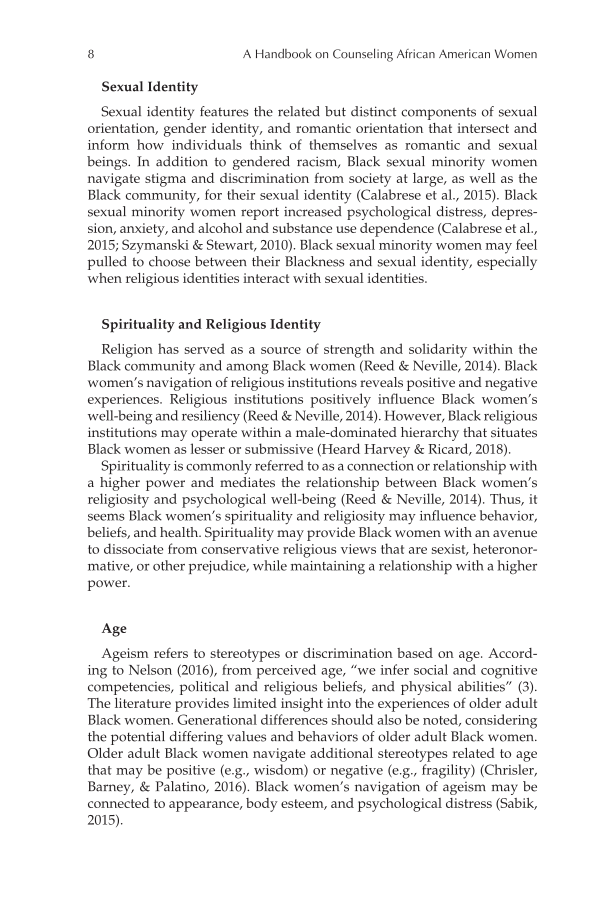8 A Handbook on Counseling African American Women Sexual Identity Sexual identity features the related but distinct components of sexual orientation, gender identity, and romantic orientation that intersect and inform how individuals think of themselves as romantic and sexual beings. In addition to gendered racism, Black sexual minority women navigate stigma and discrimination from society at large, as well as the Black community, for their sexual identity (Calabrese et al., 2015). Black sexual minority women report increased psychological distress, depres- sion, anxiety, and alcohol and substance use dependence (Calabrese et al., 2015 Szymanski & Stewart, 2010). Black sexual minority women may feel pulled to choose between their Blackness and sexual identity, especially when religious identities interact with sexual identities. Spirituality and Religious Identity Religion has served as a source of strength and solidarity within the Black community and among Black women (Reed & Neville, 2014). Black women’s navigation of religious institutions reveals positive and negative experiences. Religious institutions positively influence Black women’s well-being and resiliency (Reed & Neville, 2014). However, Black religious institutions may operate within a male-dominated hierarchy that situates Black women as lesser or submissive (Heard Harvey & Ricard, 2018). Spirituality is commonly referred to as a connection or relationship with a higher power and mediates the relationship between Black women’s religiosity and psychological well-being (Reed & Neville, 2014). Thus, it seems Black women’s spirituality and religiosity may influence behavior, beliefs, and health. Spirituality may provide Black women with an avenue to dissociate from conservative religious views that are sexist, heteronor- mative, or other prejudice, while maintaining a relationship with a higher power. Age Ageism refers to stereotypes or discrimination based on age. Accord- ing to Nelson (2016), from perceived age, “we infer social and cognitive competencies, political and religious beliefs, and physical abilities” (3). The literature provides limited insight into the experiences of older adult Black women. Generational differences should also be noted, considering the potential differing values and behaviors of older adult Black women. Older adult Black women navigate additional stereotypes related to age that may be positive (e.g., wisdom) or negative (e.g., fragility) (Chrisler, Barney, & Palatino, 2016). Black women’s navigation of ageism may be connected to appearance, body esteem, and psychological distress (Sabik, 2015).
Document Details My Account Print multiple pages
Print
You have printed 0 times in the last 24 hours.
Your print count will reset on at .
You may print 0 more time(s) before then.
You may print a maximum of 0 pages at a time.



















































































































































































































































































































































